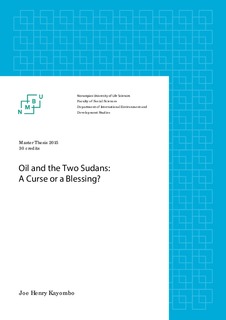| dc.description.abstract | South Sudan gained its independence in 2011 after two long civil wars that claimed about 2 million people and displaced almost 4 million. The Comprehensive Peace Agreement signed in 2005 ended Sudan’s decades of civil war with the South. The causes of the civil wars were underdevelopment, marginalisation of the Southern Region, Darfur, Kordofan, the Blue Nile, the eastern regions, and the Khartoum-led government’s desire to make the entire Sudan and an Arab state with Islam as its religion. At independence, South Sudan went away with 3/4 of the oil that was unified Sudan’s primary commodity. From oil revenues, the government constructed refineries and oil pipelines in the north leaving the South underdeveloped. South Being a landlocked country, it relies on Sudan’s pipeline. Sudan has been charging South Sudan almost $25 per barrel (the most expensive in the world) for the use of the pipeline.
After South Sudan’s independence, many issues remained unresolved with its neighbour, Sudan. Among the unresolved issues include the borderline and the disputed areas like Abyei. This thesis aims at examining how the oil and pipeline have shaped the post-independence relationship between the two nations. The thesis looks at how oil can bring peace between the two countries while highlighting which country is benefiting more from the oil. The Study used a qualitative method with the use of interviews, documents, books and online journals blended to compile data presented in this paper. One on one interviews were done with respondents in April 2015 in Juba, South Sudan. The respondents included University and college lecturers, politicians, embassy officials, researchers, journalists, editors, civil society organisations as well as policy analysts. The findings have been analysed using the offensive realism theory. The Analysis indicates that South Sudan is rich in oil but lacks access to markets, refineries and the oil pipeline. On the other hand, Sudan has less oil but has a well-developed oil industry supported by refineries and the pipeline. To compensate for the shortfall or loss of oil to South Sudan, Sudan is charging high prices that bring to the 50/50 ratio, a ratio that was there during the CPA period. The thesis found that the oil has affected the unresolved issues, especially those concerning the disputed areas. Both are weak states with civil wars going on in their respective territories straining the relationship further. There are accusations of each country supporting the rebels in the other country. | nb_NO |

